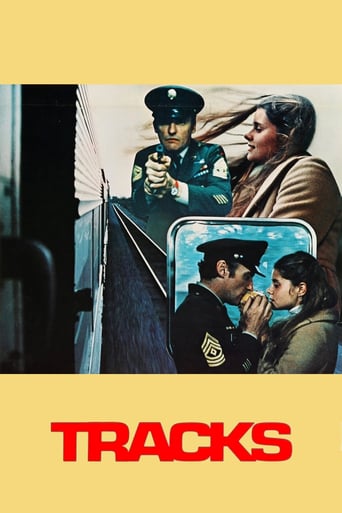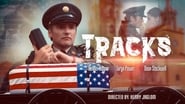Hollywoodcanteen1945
I was slightly perplexed that most of the other people who commented on this classic Dennis Hopper film either didn't understand the ending, or thought the ending was stupid. It's very clear to me.This whole film is nothing more than a symbolic train ride to hell. The 1940s World War II-era soundtrack is a backdrop for a "popular" war. A war where the entire nation banded together to serve and defend their country. Dennis Hopper's character is a baby-boomer brought up with the backdrop of World War II, a war of honor. His "war" is the complete opposite; shunned and protested. He keeps constantly playing the old time music to help him reinforce his beliefs that his service in Viet-Nam was the good and decent thing to do. The people on the train are symbols of our nation; wrapped up in every their everyday lives, totally unconcerned or pre-occupied with the war which was so far away. The ending is a brutal statement that the only way the public could come to grips with the experiences with the combat veterans was to bring the horrors of the war back home. Tracks is an out-standing, yet controversial, and highly symbolic view on the horrors of the Viet-Nam War. Seems to me that this movie couldn't be re-made today; only updating it to the war in Iraq. How sad that some 30 years later, Tracks is still not an out-dated film about the horrors of war, and the public's indifference to the suffering of the soldiers fighting over there.
dtucker86
Dennis Hopper is an actor that I am almost ashamed to admit I like but he is. This is a fine film and one of his best performances. You can tell he is stoned throughout much of the film but he still delivers playing a tormented man. This was one of the first Hollywood films to deal with Vietnam and one of the best. Hopper sears the screen as the man who cannot let go of the hell of war. I liked the WWII songs they play in the film like "Were Gonna Have To Slap a Dirty Little Jap" and "Theyll be a hot time in the town of Berlin". Henry Jaglom is a real genius of a director and I think this is his best film. It has never been shown on Tv as far as I know and it is a real loss. Rent and and be amazed.
Jill-68
This movie started out so wonderfully intriguing....and then fell apart so awfully hard. It was downright painful for me to watch this movie die...I had such hopes for it. All these characters riding on a train...all their lives intertwined for the short journey...people with Secrets...simultaneous conversations recorded so spontaneously I felt like I was eavesdropping. Scenes of sexual intimacy that made me feel like a voyeur...Dennis Hopper running through the train completely naked, making me turn my head away like a startled passenger... The more I think about it, the angrier I get...surely someone could have rewritten the last half of the script and turned this film into something much, much better. As it is, I just watch my favorite scenes from the first half of the movie over & over again....the conversations with Dean Stockwell are priceless. (And hey, isn't he wearing the same pair of tennis shoes in Paris, Texas?).
Carlos Xavier
9. TRACKS (drama, 1975) Jack (Dennis Hopper), an ex-Vietnam veteran, is escorting the coffin of his dead friend's body, which is to be buried in their hometown. They travel by train, where Jack meets various interesting people.Critique: Actor Dennis Hopper has said that one of his main influences in acting was James Dean ("he was pure gold man"). He worked with Dean in his first film, the quintessential-classic 'Rebel Without a Cause' (1955) and in his second film 'Giant' (1956). Dean's mannerist style, irreverent mumbling and magnetic charisma made him into an overnight legend never before seen… and then there was Dennis Hopper. Though at first I saw Hopper as one of Dean's many clones, he has evolved into a surprisingly charismatic presence, full of his own style of anger and psychosis. One can see that early on he was very much influenced by Dean's untimely (or timely) death in 1955. His brief marriage to the daughter of a Hollywood 'mogul' producer landed him in the blacklist for his bad boy streak. Through the 1960s and 1970s he drifted in and out of Hollywood, spending most of his time in Europe (playing the "ugly American" parts). His experiments with drugs and alcohol landed him with his best financial triumph in 'Easy Rider' (1968). But that was all. He again disappeared into obscurity and fell further into disfavor with the "Hollywood crowd".His career suddenly resurfaced giving a tour-De-force performance in David Lynch's controversial 'Blue Velvet' (1985), and as a director with the influential 'Colors' (1988). Though I still admire his maniacal Frank Booth in 'Blue Velvet' (thus, typecasting him in 'psycho' roles), I rather like him in 'Tracks'. He displays great depth (most of the film's dialog is improvised), passionate mood swings, and a sense of reality. It could well be Hopper himself we see on screen trying to exorcise his inner demons. Director Henry Jaglom's claustrophobic camera-work, angst written screenplay and fallible pacing serves Hopper perfectly, the non-conformist. Hopper's Jack describes himself as being shy but is, in truth, a disturbed little soul. Lapsing into frequent, uncontrollable fits, anti-social, and traumatized by the loss of his childhood (the film's score works perfectly on the same wavelength). This is his most accomplished role yet.QUOTE: Jack: "Do you think about your childhood often? I think about mine. When the going gets rough, I think about my childhood.'





